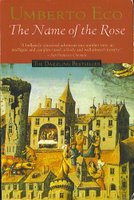 Well, I have finally finished reading The Name of the Rose, a novel by Umberto Eco. Reading the plot summary you might think this was some kind of Dan Brown-esque book, but The Name of the Rose is more of a 500-page intellectual slugfest rather than a beach read and/or Audrey Tautou vehicle.
Well, I have finally finished reading The Name of the Rose, a novel by Umberto Eco. Reading the plot summary you might think this was some kind of Dan Brown-esque book, but The Name of the Rose is more of a 500-page intellectual slugfest rather than a beach read and/or Audrey Tautou vehicle.The story takes place in 1327. The basic plot concerns Adso of Melk (the narrator) and his master William of Baskerville, the latter being tasked to investigate the mysterious happenings at a Italian abbey. In addition, William also spends a fair amount of time trying to negotiate with representatives of the exiled Pope John XXII on behalf of monks aligned with the Holy Roman Emperor Louis the Bavarian. I won't get too much into details since you can read the book yourself. Secret book, labyrinth, yada yada. Although it is often billed as a murder mystery, to me the book was a lot more about the how than the why. If you are looking for a story that wraps up nicely and the hero gets the girl this is not the book for you. William's last (recorded) conversation with Adso, for example, basically involves the statement that there can be no learning if God is omnipotent because if God can do whatever He wants then there cannot be any universal laws and logical arguments are invalid; either that, or God does not exist. My guess is that William was a closet atheist who lamented the fact that he had to teach through riddles but you can read the book and decide for yourself.
The book covers a wide array of topics, the two most prevalent being theology and deductive logic. There are long discussions about the poverty of Christ, laughter and satire as interpreted in Scripture, the Inquisition, various heretical movements (or not, depending on your point of view), and of course the fact that women are dirty, dirty whores. A lot of the conversations between William and Adso also revolve around logical deduction, syllogisms, dialectics, the empirical method and other philosophical sounding stuff. It also covers a lot of history, mainly the tensions between the Holy Roman Empire and the Papacy.
I would give this book four out of five stars, mainly due to the frequent use of untranslated Latin phrases and the fact that you probably have to read it about five times to really get your arms around it. I highly recommend the book to anyone who in interested in things medieval, big words, dissertations on logic, and five page descriptions of Italian frescoes.
No comments:
Post a Comment